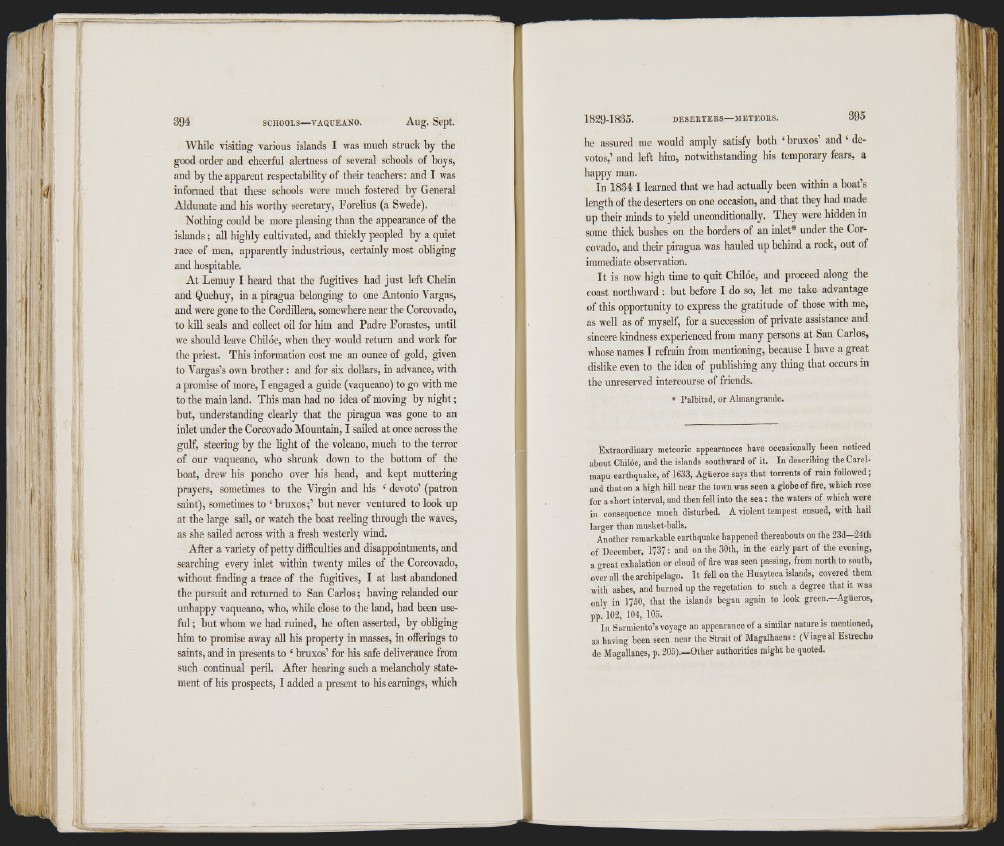
Vi
)!f ': !' : (
‘J
"I
1 h
f I
394 SCHOOLS VAQÜEANO. Aug. Sept.
While visiting various islands I was much struck by the
good order and cheerful alertness of several schools of boys,
and by the apparent respectability of their teachers: and I was
informed that these schools were much fostered by General
Aldunate and his worthy secretary, Forelius (a Swede).
Nothing could be more pleasing than the appearance of the
islands ; all highly cultivated, and thickly peopled by a quiet
race of men, apparently industrious, certainly most obliging
and hospitable.
At Lemuy I heard that the fugitives had just left Chelin
and Quehuy, in a piragua belonging to one Antonio Vargas,
and were gone to the Cordillera, somewhere near the Corcovado,
to kill seals and collect oil for him and Padre Forastes, until
we should leave Chiloe, when they would return and work for
the priest. This information cost me an ounce of gold, given
to Vargas’s own brother : and for six dollars, in advance, with
a promise of more, I engaged a guide (vaqueano) to go with me
to the main land. This man had no idea of moving by night;
but, understanding clearly that the piragua was gone to an
inlet under the Corcovado Mountain, I sailed at once across the
gulf, steering by the light of the volcano, much to the terror
of our vaqueano, who shrunk down to the bottom of the
boat, drew his poncho over his head, mid kept muttering
prayers, sometimes to the Virgin and his ‘ devoto’ (patron
saint), sometimes to ‘ bruxos;’ but never ventured to look up
at the large sail, or watch the boat reeling through the waves,
as she sailed across with a fresh westerly wind.
After a variety of petty difficulties and disappointments, and
searching every inlet within twenty miles of the Corcovado,
without finding a trace of the fugitives, I at last abandoned
the pursuit and returned to San Carlos; having relanded our
unhappy vaqueano, who, while close to the land, had been useful
; but whom we had ruined, he often asserted, by obliging
him to promise away all his property in masses, in offerings to
saints, and in presents to ‘ bruxos’ for his safe deliverance from
such continual peril. After hearing such a melancholy statement
of his prospects, I added a present to his earnings, which
he assured me would amply satisfy both ‘bruxos and ‘ devotos,’
and left him, notwithstanding his temporary fears, a
happy man.
In 1834 I learned that we had actually been within a boat’s
length of the deserters on one occasion, and that they had made
up their minds to yield unconditionally. They were hidden in
some thick bushes on the borders of an inlet* under the Corcovado,
and their piragua was hauled up behind a rock, out of
immediate observation.
It is now high time to quit Chilóe, and proceed along the
coast northward : but before I do so, let me take advantage
of this opportunity to express the gratitude of those with me,
as well as of myself, for a succession of private assistance and
sincere kindness experienced from many persons at San Carlos,
whose names I refrain from mentioning, because I have a great
dislike even to the idea of publishing any thing that occurs in
the unreserved intercourse of friends.
* Palbitad, or Almangrande.
Extraordinary meteoric appearances have occasionally been noticed
about Chilóe, and the islands southward of it. In describing the Carel-
mapu earthquake, of 1633, Agüeros says that torrents of rain followed;
and that on a high hill near the town was seen a globe of fire, which rose
for a short interval, and then fell into the sea; the waters of which were
in consequence much disturbed. A violent tempest ensued, with hail
larger than musket-balls.
Another remarkable earthquake happened thereabouts on the 23d—24th
of December, 1737: and on the 30th, in the early part of the evening,
a great exhalation or cloud of fire was seen passing, from north to south,
over all the archipelago. It fell on the Huayteca islands, covered them
with ashes, and burned up the vegetation to such a degree that it was
only in 1750, that the islands began again to look green.—Agüeros,
pp. 102, 104, 105. . . .
In Sarmiento’s voyage an appearance of a similar nature is mentioned,
as having been seen near the Strait of Magalhaens: (Viage al Estrecho
de Magallanes, p. 205) Other authorities might be quoted.
Í!
! I